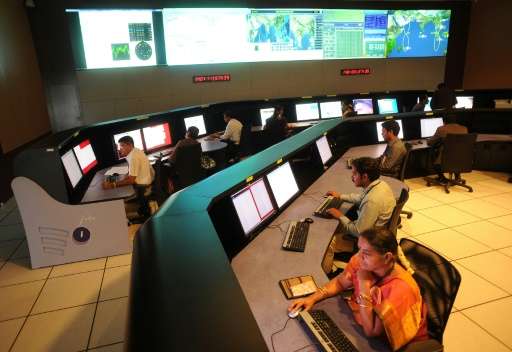India's mini space shuttle to blast off on test run

India was making final preparations Sunday for the launch of its first model space shuttle, as it bids to join the race to one day make rockets as reusable as airplanes.
India's seven-metre (23-foot) shuttle is expected to blast off from a southeastern space port on Monday, in a crucial step to eventually developing a full-scale, reusable one to send up satellites in the future.
India's space agency director Devi Prasad Karnik told AFP that the test flight was set to occur "any time during the launch window between 7am (0130 GMT) and 11am (0530 GMT), depending upon wind and weather conditions".
The scale-model shuttle will be propelled 70 kilometres into the atmosphere using a 15-tonne rocket before splashing down 10 minutes later into the Bay of Bengal, some 500 kilometres from the Sriharikota space port.
The Indian Space Research Organisation (ISRO) has developed the 1.7-tonne (1,542 kilogram) winged shuttle reportedly on a miniscule budget of one billion rupees ($14 million) over a five-year period.
Called the Reusable Launch Vehicle or RLV-TD, the shuttle will not survive Monday's test flight, but scientists hope that subsequent ones built six times as big over the next decade will glide safely back to land.
"In subsequent test flights, we will attempt to land the reusable vehicle at a specific location on land like an aircraft does on a runway so that we can again use it for launching more satellites," K. Sivan, director of a space research centre developing the vehicles at ISRO, told AFP.
"The exercise (on Monday) will enable us to collect data on hypersonic speed, autonomous landing" and other useful information, Sivan said.
India faces stiff competition including from global companies which are developing their own reusable rockets after NASA retired its space shuttle programme in 2011.
Reusable rockets would cut costs and waste in the space industry, which currently loses millions of dollars in jettisoned machinery after each launch.
Billionaire Elon Musk's SpaceX and Amazon owner Jeff Bezos's Blue Origin have already successfully undertaken their own test launches.
Russia, Japan and the European Space Agency are also developing similar technology and are in testing stages.
SpaceX tested its powerful Falcon 9 rocket in December while Blue Origin's New Shepard successfully completed a third launch and vertical landing in April this year.
But ISRO hopes to develop its own frugal shuttle, as it seeks to cash in on a huge and lucrative demand from other countries to send up their satellites.
ISRO made global headlines in 2013 after it successfully launched an unmanned mission to orbit Mars, after spending just $73 million, compared to NASA's $671 million outlayed for its Maven Mars mission.
© 2016 AFP





















